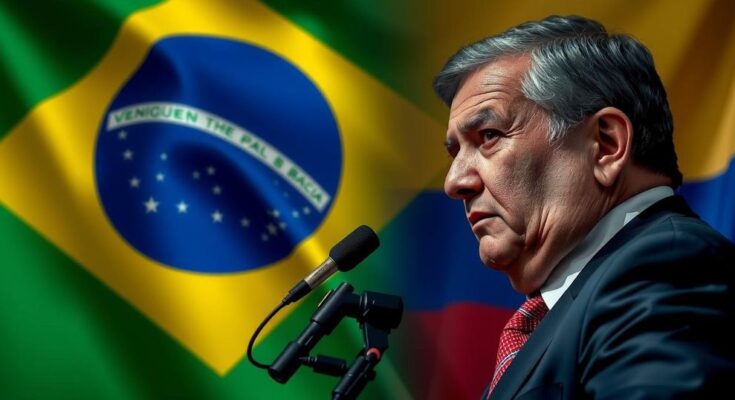Brazil’s government has criticized Venezuela for escalating tensions and resorting to personal attacks against Brazilian officials, including President Lula. This development follows Venezuela’s dissatisfaction over Brazil’s non-support for its BRICS membership application and concerns over transparency in the recent Venezuelan presidential election. Brazil maintains that diplomatic exchanges should depend on respectful dialogue and non-intervention principles.
On Friday, Brazil’s government addressed the rising hostilities with Venezuela, expressing astonishment at the “offensive tone” adopted by Venezuelan authorities. The Brazilian Foreign Ministry criticized Venezuela’s recent escalation of personal attacks directed at Brazilian officials, including President Luiz Inácio Lula da Silva—a long-standing ally. The Ministry highlighted that personal insults and inflammatory rhetoric deviate from the respectful diplomatic conduct that Brazil has shown towards Venezuela.The conflict intensified after a senior adviser to President Lula indicated that Brazil did not back Venezuela’s push to join the BRICS group of developing countries during a recent summit in Russia. This decision further complicated the strained relations between the two countries, particularly following disputed outcomes from Venezuela’s presidential elections in July and subsequent calls for electoral transparency from Brazil and other nations.Venezuela’s Foreign Ministry responded to Brazil’s stance by summoning Breno Hermann, Brazil’s chargé d’affaires in Venezuela, to express its strong disapproval of what it termed “interventionist and rude remarks” from Brazilian officials. Furthermore, accusations were made against Celso Amorim, Brazil’s former foreign minister, labeling him a “messenger of American imperialism” for his critiques of Venezuelan electoral processes, claiming such behavior jeopardizes the relationship between the two nations.Brazil’s initial strategy involved maintaining silence to prevent further escalation; however, this changed after images were circulated on social media by Venezuela’s Bolivarian National Police, depicting a silhouette resembling Lula alongside a statement threatening repercussions for any perceived aggression against Venezuela.In response to escalating tensions, the Brazilian Foreign Ministry emphasized its commitment to non-intervention and respect for the sovereignty of neighboring nations, asserting that Brazil’s involvement in Venezuela’s electoral matters originates from its role in the 2023 Barbados Agreements—an accord aimed at establishing fair electoral conditions. Furthermore, it reiterated the importance of constructive dialogue and mutual respect in fostering partnerships between countries.Amorim acknowledged the palpable discomfort in bilateral relations, attributing it primarily to the Maduro administration’s hesitance to release comprehensive election results. He noted that the future of diplomatic relations would depend upon specific actions taken by Venezuela. Venezuela’s electoral authorities indicated that they were unable to provide detailed election results due to alleged hacking of their website, while opposition factions claimed to have secured and shared substantial evidence indicating their candidate had trounced Maduro in the election.In the aftermath of the electoral situation, Presidents Lula, Gustavo Petro of Colombia, and former Mexican President Manuel López Obrador—who share leftist ideologies and maintained a friendly dialogue with Maduro—endeavored to mediate the electoral dispute, albeit unsuccessfully. Consequently, Maduro has solidified his grip on power, overhauled his Cabinet, and imprisoned numerous dissenters.Further complicating diplomatic relations, Brazil opposed Venezuela’s admission into the expanded BRICS group, which now includes several new member states such as Iran, Egypt, and Saudi Arabia. Amorim stated that Brazil is disinclined toward further indefinite expansion and holds that BRICS members should possess the capacity to effectively represent regional interests, a criterion Venezuela currently does not fulfill. Venezuela’s Foreign Affairs Ministry condemned Brazil’s opposition as “irrational behavior,” drawing parallels to the sanctions imposed by the United States on Venezuela.
This article discusses the escalating diplomatic tensions between Brazil and Venezuela, particularly focusing on personal attacks made by the Venezuelan government against Brazil’s officials and President Lula. The conflict stems from Venezuela’s criticism regarding Brazil’s lack of support for its bid to join the BRICS economic group and the broader consequences of disputed electoral results from Venezuela’s recent presidential election. The conclusions reflect the deteriorating relationship between the two countries, rooted deeply in political differences and accusations, amidst ongoing diplomatic discussions and efforts at mediation.
In summary, Brazil’s recent formal criticisms of Venezuela highlight the escalating diplomatic rift characterized by personal attacks and inflammatory rhetoric. The primary sources of contention include Brazil’s refusal to support Venezuela’s entry into the BRICS coalition and concerns regarding electoral transparency in Venezuela. This situation illustrates the complexities of bilateral relations, shaped by historical allegiances and contemporary political challenges. Brazil emphasizes the need for respectful dialogue and mutual understanding while expressing its disapproval of Venezuela’s belligerent stance, indicating that improvements in diplomatic relations will depend significantly on Venezuela’s future actions.
Original Source: apnews.com




